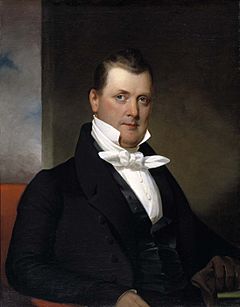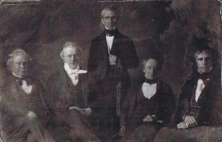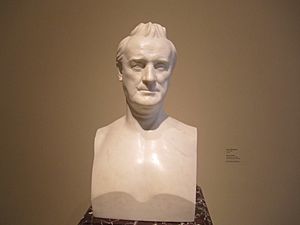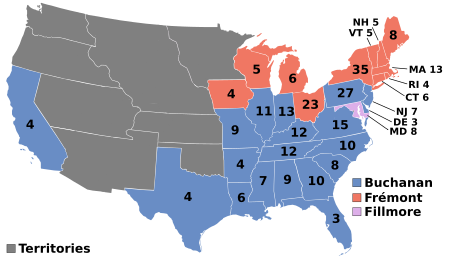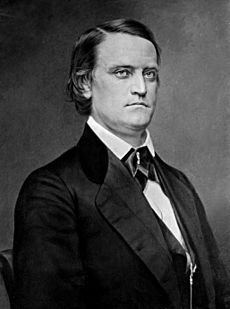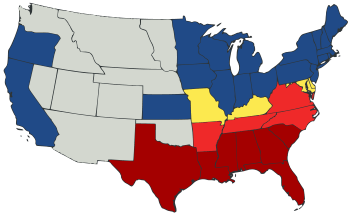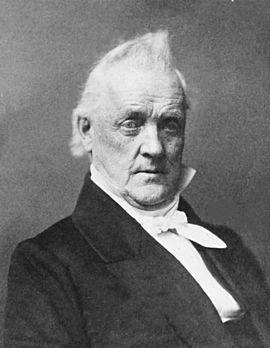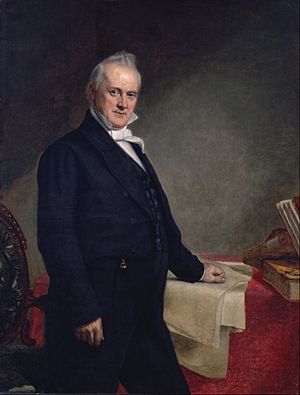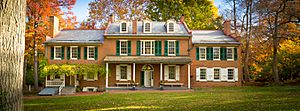James Buchanan facts for kids
Quick facts for kids
James Buchanan
|
|
|---|---|
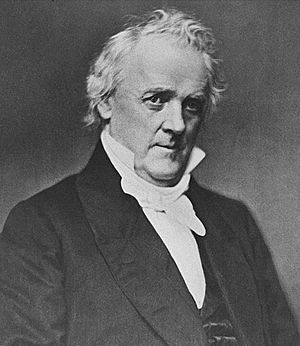
Portrait by Mathew Brady, c. 1850–1868
|
|
| 15th President of the United States | |
| In office March 4, 1857 – March 4, 1861 |
|
| Vice President | John C. Breckinridge |
| Preceded by | Franklin Pierce |
| Succeeded by | Abraham Lincoln |
| 20th United States Minister to the United Kingdom | |
| In office August 23, 1853 – March 15, 1856 |
|
| President | Franklin Pierce |
| Preceded by | Joseph Reed Ingersoll |
| Succeeded by | George M. Dallas |
| 17th United States Secretary of State | |
| In office March 10, 1845 – March 7, 1849 |
|
| President | |
| Preceded by | John C. Calhoun |
| Succeeded by | John M. Clayton |
| United States Senator from Pennsylvania |
|
| In office December 6, 1834 – March 5, 1845 |
|
| Preceded by | William Wilkins |
| Succeeded by | Simon Cameron |
| 5th United States Minister to Russia | |
| In office June 11, 1832 – August 5, 1833 |
|
| President | Andrew Jackson |
| Preceded by | John Randolph |
| Succeeded by | William Wilkins |
| Chairman of the House Judiciary Committee | |
| In office March 5, 1829 – March 3, 1831 |
|
| Preceded by | Philip P. Barbour |
| Succeeded by | Warren R. Davis |
| Member of the U.S. House of Representatives from Pennsylvania |
|
| In office March 4, 1821 – March 3, 1831 |
|
| Preceded by |
|
| Succeeded by |
|
| Constituency |
|
| Member of the Pennsylvania House of Representatives from Lancaster County |
|
| In office 1814–1816 |
|
| Preceded by | Emanuel Reigart, Joel Lightner, Jacob Grosh, John Graff, Henry Hambright, Robert Maxwell |
| Succeeded by | Joel Lightner, Hugh Martin, John Forrey, Henry Hambright, Jasper Slaymaker, Jacob Grosh |
| Personal details | |
| Born | April 23, 1791 Cove Gap, Pennsylvania, U.S. |
| Died | June 1, 1868 (aged 77) Lancaster, Pennsylvania, U.S. |
| Resting place | Woodward Hill Cemetery |
| Political party |
|
| Relatives |
|
| Education | Dickinson College (BA) |
| Occupation |
|
| Signature | |
| Military service | |
| Branch/service | Pennsylvania Militia |
| Years of service | 1814 |
| Rank | Private |
| Unit | Henry Shippen's Company, 1st Brigade, 4th Division |
| Battles/wars | |
James Buchanan Jr. (April 23, 1791 – June 1, 1868) was an American lawyer and politician. He served as the 15th president of the United States from 1857 to 1861. Before becoming president, he was Secretary of State and represented Pennsylvania in the U.S. Congress. He believed in states' rights, especially regarding slavery. He also thought the federal government should have a smaller role. Buchanan was the last president born in the 1700s.
Buchanan was a well-known lawyer in Pennsylvania. He first won election to the state's House of Representatives as a Federalist. In 1820, he was elected to the U.S. House of Representatives. He served five terms there and joined Andrew Jackson's Democratic Party. In 1832, Buchanan served as Jackson's ambassador to Russia. He was elected as a U.S. senator from Pennsylvania in 1834 and served for 11 years. Later, he became President James K. Polk's Secretary of State in 1845. Eight years later, President Franklin Pierce named him ambassador to the United Kingdom.
Starting in 1844, Buchanan often tried to become the Democratic party's choice for president. He finally won the nomination in 1856. He beat the current president, Franklin Pierce, and Senator Stephen A. Douglas. Buchanan was away in London as an ambassador, so he wasn't involved in the arguments about slavery. This helped him get the nomination. Buchanan and his running mate, John C. Breckinridge, won almost all the slave states. They defeated John C. Frémont and former president Millard Fillmore in the 1856 presidential election.
As president, Buchanan supported the Supreme Court's decision in the Dred Scott case. This decision favored slavery. He also agreed with Southern efforts to make Kansas a slave state under the Lecompton Constitution. This angered both Republicans and Northern Democrats. Buchanan had promised to serve only one term. He supported Breckinridge's try for president in the 1860 election, but Breckinridge lost. Buchanan could not bring the Democratic party back together. This led to the election of Republican Abraham Lincoln.
Many people have criticized Buchanan's leadership before the American Civil War. He angered the North by not stopping states from leaving the Union. He also angered the South by not giving in to their demands. He tried to unite the country with the Corwin Amendment, but it didn't work. He tried to send help to Fort Sumter, but it failed. He didn't prepare the military for war. People have called his failure to prevent the Civil War "incompetence." He spent his last years defending his actions. Buchanan never married and was the only U.S. president to remain a bachelor. He died in 1868. Historians often rank Buchanan as one of the least successful presidents in American history.
Contents
- Early Life and Education
- Congressional Career
- Diplomatic Career
- Presidential Election of 1856
- Presidency (1857–1861)
- Inauguration and Early Decisions
- Presidential Cabinet and Appointments
- The Dred Scott Case and Its Impact
- The Panic of 1857
- The Utah War
- Bleeding Kansas
- 1858 Mid-Term Elections
- Foreign Policy Achievements
- Investigating the Administration
- The Election of 1860 and Secession
- States Leaving the Union
- Proposed Constitutional Amendment
- New States Admitted to the Union
- After the Presidency (1861–1868)
- Political Views
- Legacy and Memorials
- See also
Early Life and Education
James Buchanan Jr. was born on April 23, 1791. He was born in a log cabin in Cove Gap, Pennsylvania. His parents were James Buchanan Sr. and Elizabeth Speer. His father came from Ireland in 1783. Soon after James was born, his family moved to a farm near Mercersburg, Pennsylvania. In 1794, they moved into the town. His father became a wealthy merchant, farmer, and real estate investor.
Buchanan went to the Old Stone Academy in Mercersburg. Then he attended Dickinson College in Carlisle, Pennsylvania. He almost got kicked out for bad behavior. But he asked for a second chance and graduated with honors in 1809. Later that year, he moved to Lancaster. James Hopkins, a top lawyer, took Buchanan on as an apprentice. In 1812, he became a lawyer in Pennsylvania. Buchanan made Lancaster his home for his whole life. His income grew quickly after he started his law practice. By 1821, he was earning a lot of money.
Buchanan started his political career with the Federalist Party. He was elected to the Pennsylvania House of Representatives in 1814 and 1815. This helped him get more clients. He supported projects paid for by the federal government. He also supported high tariffs and a national bank. He strongly criticized President James Madison during the War of 1812.
He was a Freemason. He served as the Master of Masonic Lodge No. 43 in Lancaster.
Military Service in the War of 1812
When the British attacked Maryland in 1814, Buchanan joined the army. He served as a private in the defense of Baltimore. He was part of Henry Shippen's Company. Buchanan is the only president with military experience who was not an officer. He is also the last president who served in the War of 1812.
Congressional Career
Serving in the U.S. House of Representatives
In 1820, Buchanan was elected to the U.S. House of Representatives. The Federalist Party was losing power then. Buchanan became a leader of the "Amalgamator party" in Pennsylvania. This group included both Democratic-Republicans and former Federalists. In the 1824 presidential election, Buchanan first supported Henry Clay. But he switched to Andrew Jackson when he saw that Pennsylvanians strongly preferred Jackson. After the election, Buchanan kept supporting Jackson. He helped organize Jackson's followers into the Democratic Party. He became an important Pennsylvania Democrat. In Washington, Buchanan strongly defended states' rights. He became close with many Southern Congressmen. He became Chairman of the Judiciary Committee. He decided not to run for a sixth term and returned to private life for a short time.
Ambassador to Russia
After Jackson was re-elected in 1832, he offered Buchanan a job. It was to be the United States Ambassador to Russia. Buchanan didn't want to leave the country, but he agreed. He was an ambassador for 18 months. During that time, he learned French, which was the main language for diplomacy. He helped make trade agreements with the Russian Empire.
Serving in the U.S. Senate
Buchanan returned home and was elected to the U.S. Senate. He replaced William Wilkins. Buchanan was re-elected in 1836 and 1842. He was a Jacksonian Democrat. He opposed bringing back the Second Bank of the United States. He also worked to remove a congressional criticism of Jackson.
During the 1838 Pennsylvania governor election, Buchanan supported David R. Porter. Porter won by a small number of votes.
Buchanan also opposed a rule that would have stopped anti-slavery petitions. He believed that the issue of slavery belonged to the states. He blamed abolitionists for causing strong feelings about the issue.
He supported states' rights and also Manifest Destiny. He wanted the U.S. to expand its territory. He opposed a treaty that gave land to the United Kingdom. Buchanan also wanted to add Texas and the Oregon Country to the U.S. Before the 1844 Democratic National Convention, Buchanan tried to become president. But the nomination went to James K. Polk, who won the election.
Diplomatic Career
Secretary of State
Buchanan was offered the job of Secretary of State in Polk's government. He also had the option to serve on the Supreme Court. He chose to be Secretary of State and served for Polk's entire term. He and Polk almost doubled the size of the United States. This happened through the Oregon Treaty and the Treaty of Guadalupe Hidalgo. These agreements added land that is now Texas, California, Nevada, New Mexico, Arizona, Utah, and Colorado. Buchanan wanted to add more territory after the Mexican-American War. Polk thought Buchanan was trying to become president. Buchanan did try to get the presidential nomination in 1848, but Senator Lewis Cass was chosen instead.
Ambassador to the United Kingdom
After the 1848 election, Zachary Taylor became president. Buchanan returned to private life. He bought a house called Wheatland near Lancaster. He watched political events from there. In 1852, he became president of the Board of Trustees for Franklin and Marshall College. He quietly campaigned for the 1852 Democratic presidential nomination. He wrote a letter against banning slavery in new territories. He became known as a "doughface" because he seemed to sympathize with the South. He didn't get the nomination, which went to Franklin Pierce. Buchanan then accepted the job of United States Minister to the United Kingdom.
Buchanan went to England in 1853 and stayed for three years. In 1850, the U.S. and Great Britain signed a treaty. It said they would both control any future canal connecting the Atlantic and Pacific Oceans. Buchanan tried to get the British to leave Central America. He also wanted to add Cuba to the U.S. He met with other U.S. ambassadors in Belgium. They wrote a document called the Ostend Manifesto. It suggested buying Cuba from Spain. It also said that taking Cuba by force would be justified if Spain refused to sell it. This document was seen as a mistake. It weakened President Pierce's government.
Presidential Election of 1856
Buchanan's time abroad helped him avoid the arguments over the Kansas–Nebraska Act. This act caused a lot of trouble about slavery in the country. He didn't openly seek the presidency, but he allowed people to support him. The 1856 Democratic National Convention met in June 1856. They created a platform that matched Buchanan's views. It supported the Fugitive Slave Law, which required escaped slaves to be returned. It also called for an end to anti-slavery protests. President Pierce wanted to be nominated again. Senator Stephen A. Douglas was also a strong candidate.
Buchanan led the first vote. He was supported by powerful Senators. They presented him as an experienced leader who could appeal to both the North and South. He won the nomination after seventeen votes. John C. Breckinridge of Kentucky joined him on the ticket.
Buchanan faced two other candidates in the election. Former Whig President Millard Fillmore ran for the American Party. John C. Frémont ran for the Republican nominee. Buchanan did not actively campaign. He wrote letters and promised to support the Democratic platform. He won every slave state except Maryland. He also won five states where slavery was not allowed, including Pennsylvania. He won 45 percent of the popular vote. He won the electoral vote with 174 out of 296 votes. His election made him the first president from Pennsylvania.
In his victory speech, Buchanan criticized Republicans. He called them a "dangerous" party that attacked the South unfairly. He said his goal was to "destroy sectional party, North or South." He wanted to bring harmony back to the Union. He tried to do this by choosing cabinet members from both North and South.
Presidency (1857–1861)
Inauguration and Early Decisions
Buchanan became president on March 4, 1857. Chief Justice Roger B. Taney gave him the oath of office. In his speech, Buchanan promised to serve only one term. He said he hated the growing divisions over slavery. He believed Congress should not decide about slavery in states or territories. He supported popular sovereignty. Buchanan also suggested a federal slave code to protect slave owners' rights. He mentioned a Supreme Court case, Dred Scott v. Sandford. He said this case would settle the slavery issue forever. The Dred Scott case was decided against Scott, the slave, and for his owner.
Historians agree that the Supreme Court's decision was a big problem. It made tensions much worse, leading to the Civil War. Historian David W. Blight said that 1857 was a "pivot" year. This was because the Dred Scott case increased fear and distrust between the North and South.
Presidential Cabinet and Appointments
| The Buchanan Cabinet | ||
|---|---|---|
| Office | Name | Term |
| President | James Buchanan | 1857–1861 |
| Vice President | John C. Breckinridge | 1857–1861 |
| Secretary of State | Lewis Cass | 1857–1860 |
| Jeremiah S. Black | 1860–1861 | |
| Secretary of Treasury | Howell Cobb | 1857–1860 |
| Philip Francis Thomas | 1860–1861 | |
| John Adams Dix | 1861 | |
| Secretary of War | John B. Floyd | 1857–1860 |
| Joseph Holt | 1861 | |
| Attorney General | Jeremiah S. Black | 1857–1860 |
| Edwin Stanton | 1860–1861 | |
| Postmaster General | Aaron V. Brown | 1857–1859 |
| Joseph Holt | 1859–1860 | |
| Horatio King | 1861 | |
| Secretary of the Navy | Isaac Toucey | 1857–1861 |
| Secretary of the Interior | Jacob Thompson | 1857–1861 |
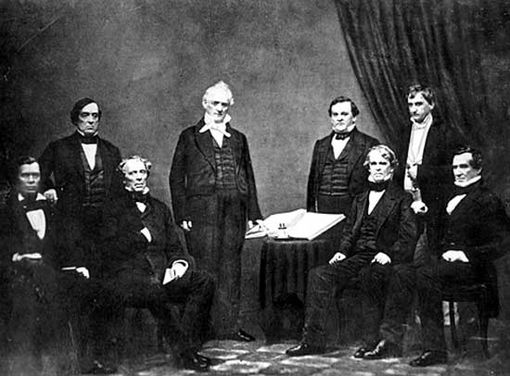
From left to right: Jacob Thompson, Lewis Cass, John B. Floyd, James Buchanan, Howell Cobb, Isaac Toucey, Joseph Holt and Jeremiah S. Black
Buchanan wanted a cabinet that would agree with him. He chose four Southerners and three Northerners. The Northerners were seen as sympathetic to the South. He wanted to control his cabinet. His choices angered many in the North. His failure to appoint followers of Stephen A. Douglas also divided the Democratic party. He removed many Northerners who were tied to his opponents. This caused his Vice President, Breckinridge, to have little role in the government.
Judicial Appointments
Buchanan appointed one Justice, Nathan Clifford, to the Supreme Court of the United States. He also appointed federal judges to other courts.
The Dred Scott Case and Its Impact
Two days after Buchanan became president, the Dred Scott decision was announced. The Supreme Court said that Congress could not stop slavery in the territories. Buchanan had hoped this decision would settle the slavery issue. He wanted to focus on other things.
The decision angered Northerners. They said it was wrong. Instead of ending the debate, it made things much worse.
The Panic of 1857
A financial crisis, called the Panic of 1857, started in the summer of that year. Many banks and businesses failed. Northern cities saw a big increase in unemployment. Buchanan believed the crisis was caused by people investing too much.
Buchanan's response was "reform, not relief." He said the government could not offer direct help. But it would continue to pay its debts. He urged states to limit how much money banks could lend. The economy slowly recovered over several years. Many Americans suffered during this time. Buchanan had hoped to reduce the government's debt. But when he left office, the debt was $17 million.
The Utah War
The Utah territory was settled by the Latter-day Saints and their leader, Brigham Young. They were becoming more hostile to federal control. Young bothered federal officers and discouraged outsiders. In 1857, the Utah Territorial Militia attacked Arkansans.
Buchanan believed the Latter-day Saints were rebelling. In July 1857, he sent Alfred Cumming with the Army to replace Young as governor. Buchanan's actions might have been too strong for the situation. Young reacted by destroying Army property. Buchanan then sent Thomas L. Kane to negotiate peace. The mission worked, and the new governor took office. The Utah War ended. Buchanan offered forgiveness to those who promised loyalty. He kept federal troops at a distance.
Bleeding Kansas
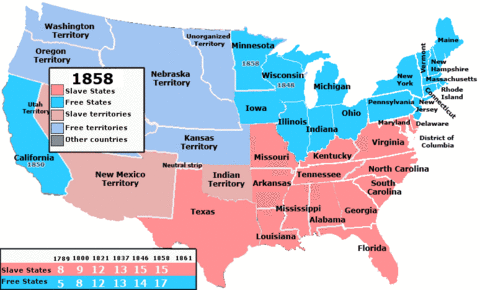
The Kansas–Nebraska Act of 1854 let settlers in the Kansas Territory decide if they wanted slavery. This led to violence between anti-slavery and pro-slavery settlers. This period was called "Bleeding Kansas." Anti-slavery settlers formed a government in Topeka. Pro-slavery settlers formed a government in Lecompton. So, the Territory had two governments, each claiming to be real.
For Kansas to become a state, its constitution needed Congress's approval. Under President Pierce, there were many violent fights over who could vote in Kansas. This situation became a national issue. Some Southern states threatened to leave the Union if Kansas became a free state. Buchanan decided to support the pro-slavery Lecompton government.
Buchanan appointed Robert J. Walker as the new Territorial Governor. He expected Walker to help the pro-slavery side. But Walker was unsure about slavery. There were conflicting votes from Topeka and Lecompton, and some votes were fraudulent. In October 1857, the Lecompton government created the pro-slavery Lecompton Constitution. They sent it to Buchanan without a public vote. Buchanan didn't want to, but he rejected it. He sent federal agents to find a compromise. The Lecompton government agreed to a vote only on the slavery question.
Despite protests, Buchanan decided to accept the Lecompton Constitution. In December 1857, he met with Stephen Douglas. Buchanan demanded that all Democrats support admitting Kansas under the Lecompton Constitution. On February 2, he sent the Lecompton Constitution to Congress. He also criticized the "revolutionary government" in Topeka. Buchanan tried hard to get Congress to approve it. He offered favors and jobs for votes. The Senate approved the Lecompton Constitution in March. But a group of different parties defeated the bill in the House. Buchanan then supported the English Bill. This bill offered Kansas statehood and public lands if they accepted the Lecompton Constitution. In August 1858, Kansans strongly rejected the Lecompton Constitution in a vote.
The fight over Kansas became a battle for control of the Democratic Party. Buchanan and most Southern Democrats were on one side. Douglas and most Northern Democrats were on the other. Douglas's group supported popular sovereignty. Buchanan insisted that Democrats follow the Dred Scott decision. This decision said the federal government could not interfere with slavery in the territories. This struggle ended only when Buchanan left office. He used his power to remove Douglas supporters from jobs.
1858 Mid-Term Elections
Douglas's Senate term was ending in 1859. The Illinois legislature, elected in 1858, would decide if Douglas would be re-elected. The Senate seat was the main issue in that election. It included the famous debates between Douglas and Abraham Lincoln. Buchanan worked against Douglas. He ran candidates for the legislature who competed with both Republicans and Douglas Democrats. This could have helped the Republicans win. It showed how much Buchanan disliked Douglas. In the end, Douglas Democrats won the election. Douglas was re-elected to the Senate. In the 1858 elections, Douglas's supporters gained control in the North. Buchanan's support was mostly limited to Southerners.
The split between Northern and Southern Democrats helped Republicans. They won more seats in the House in the 1858 elections. This allowed them to block most of Buchanan's plans. Buchanan vetoed six important Republican laws. These included the Homestead Act, which would give land to settlers. He also vetoed the Morrill Act, which would create colleges. Buchanan said these acts were against the Constitution.
Foreign Policy Achievements
Buchanan wanted to increase U.S. influence in Central America. He hoped to change a treaty that limited U.S. power there. He also wanted to establish American control over parts of Mexico. Most importantly, he wanted to get Cuba. After talks with the British, he convinced them to give some islands to Honduras and a coast to Nicaragua. However, the House of Representatives largely blocked his plans for Cuba and Mexico.
Buchanan also thought about buying Alaska from the Russian Empire. He wanted it as a place for Mormon settlers. But he and the Russians could not agree on a price. In China, his government gained trade benefits through a treaty. In 1858, Buchanan sent an expedition to Paraguay. This was to punish Paraguay for firing on a U.S. ship. The expedition resulted in an apology and payment from Paraguay.
King Rama IV of Siam offered Buchanan a herd of elephants. But the letter arrived after Buchanan left office. Lincoln, Buchanan's successor, declined the offer. He said the climate was not suitable. Buchanan also had other pets, including bald eagles and a Newfoundland dog.
Investigating the Administration
In March 1860, the House formed a committee to investigate Buchanan's administration. It was called the Covode Committee. They looked into claims of wrongdoing by his cabinet members. Buchanan's supporters said the committee was unfair. They said its chairman had a personal grudge.
The committee could not find enough reasons to remove Buchanan from office. However, their report in June claimed corruption and abuse of power in his cabinet. Republicans also accused Buchanan of trying to influence members of Congress. This was related to the pro-slavery Lecompton Constitution for Kansas. Democrats said there was little proof.
Buchanan said he had "passed triumphantly through this ordeal." Republicans used the committee's report in the 1860 presidential election.
The Election of 1860 and Secession
Buchanan had promised not to run for re-election. He told his successor, Lincoln, that he would be very happy to return home.
The 1860 Democratic National Convention met in April. Douglas led the votes, but he couldn't get enough support. The convention stopped and met again in Baltimore in June. Douglas finally won the nomination. But some Southerners refused to accept it. They nominated Vice President Breckinridge as their own candidate. Buchanan had a dislike for Douglas. He didn't help unite the party. He weakly supported Breckinridge. The Democratic Party split. This allowed Republican nominee Abraham Lincoln to win the election. Lincoln's support in the North gave him enough electoral votes. Buchanan was the last Democrat to win a presidential election until 1884.
Before Lincoln's election, General Winfield Scott warned Buchanan. He said Lincoln's win would likely cause states to leave the Union. Scott suggested sending federal troops to protect federal property. But he also said there weren't many troops available. Since 1857, Congress had not made the army stronger. Buchanan didn't trust Scott and ignored his advice. After Lincoln won, Buchanan told his War Secretary to send help to Southern forts. But the Secretary convinced him to cancel the order.
States Leaving the Union
With Lincoln's victory, talk of states leaving the Union became very strong. Buchanan had to address this in his last speech to Congress in December. He said states did not have the right to leave the Union. But he also said the federal government could not stop them. He blamed the crisis on "interference of the Northern people with the question of slavery." He suggested that if the North didn't change its laws, the Southern states would be justified in resisting the government. Buchanan suggested a constitutional amendment. It would confirm that slavery was allowed in states and territories. His speech was criticized by both the North and the South. Five days later, Treasury Secretary Howell Cobb resigned.
South Carolina left the Union on December 20, 1860. Buchanan tried to appeal to moderate Southerners. He proposed amendments to protect slavery. He also met with South Carolina officials about Fort Sumter. Federal forces still controlled the fort in Charleston, South Carolina. Buchanan refused to fire his Interior Secretary, who was discussing secession. He also refused to fire War Secretary John B. Floyd. Floyd resigned, but not before sending many firearms to Southern states. These later went to the Confederacy. Buchanan still sought advice from Southern leaders.
Many people tried to find a compromise to stop secession. These included Senator John J. Crittenden and former president John Tyler. Buchanan supported these efforts. But they all failed.
Despite these efforts, six more slave states left the Union by January 1861. Buchanan replaced his Southern cabinet members with people who wanted to preserve the Union. When Buchanan thought about giving up Fort Sumter, his new cabinet members threatened to resign. Buchanan changed his mind. On January 5, Buchanan decided to send help to Fort Sumter. He sent a ship with men and supplies. But he didn't ask the fort to provide covering fire. The ship had to return North without delivering anything. Buchanan chose not to respond to this act of war. He still tried to find a compromise. He received a message from the fort that supplies were low. But the response was left for Lincoln, who became president the next day.
Proposed Constitutional Amendment
On March 2, 1861, Congress approved an amendment to the U.S. Constitution. This amendment would protect slavery in the states from being changed or stopped by Congress. This proposed amendment was sent to the states for approval. It was known as the Corwin Amendment. It was never approved by enough states.
New States Admitted to the Union
Three new states joined the Union while Buchanan was president:
After the Presidency (1861–1868)
The Civil War began within two months of Buchanan leaving office. He supported the Union. He wrote that the attack on Fort Sumter started the war. He said the Union had no choice but to fight hard. He also urged his fellow Pennsylvania Democrats to join the volunteers fighting for the Union.
Buchanan worked to defend his actions before the Civil War. Some people called the war "Buchanan's War." He was very upset by the strong criticism against him. He became sick and depressed. In October 1862, he defended himself in letters published in a newspaper. He then started writing his memoir, Mr. Buchanan's Administration on the Eve of Rebellion. It was published in 1866.
Soon after his memoir was published, Buchanan caught a cold in May 1868. It got worse because of his age. He died on June 1, 1868, from respiratory failure. He was 77 years old. He died at his home, Wheatland. He was buried in Woodward Hill Cemetery in Lancaster.
Political Views
Many Northerners who were against slavery called Buchanan a "doughface." This meant he was a Northerner who had pro-Southern beliefs. After he was elected, he said his main goal was to stop the arguments about slavery. He wanted to end political parties that were divided by region. Buchanan personally did not like slavery. But he believed that abolitionists were making it harder to solve the slavery problem. He said that before abolitionists started their protests, many people in slave states wanted to end slavery slowly. But after the protests, no one supported that idea anymore. He thought abolitionists had delayed the end of slavery in some states for a long time.
Buchanan believed that self-government meant being careful. He thought the Constitution was about people controlling themselves and their representatives. He said that people's interests might seem the same, but local differences always made them seem to conflict. He believed that only mutual understanding could stop these conflicts. Regarding slavery and the Constitution, he said that even though people in Pennsylvania were against slavery, they would respect the Constitution. He believed slavery was a state issue.
Tariffs were a big issue at the time. Buchanan was torn between free trade and protective tariffs. He knew that either would help one part of the country but hurt another. As a senator from Pennsylvania, he said he was seen as a strong supporter of protection in other states. But in Pennsylvania, he was called an enemy of it.
Buchanan also struggled between expanding the country and protecting people's rights. He wanted to expand the U.S. for the good of the nation. He said that people would naturally move west. But he also didn't want to expand slavery. For example, he hoped that adding Texas would limit slavery, not increase it.
Legacy and Memorials
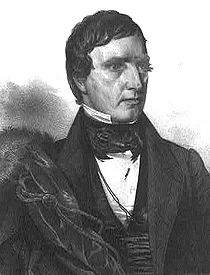
Historical Reputation
Buchanan thought that "history will vindicate my memory." But historians have criticized him. They say he was unwilling or unable to act when states started leaving the Union. When scholars rank U.S. presidents, Buchanan is almost always at the bottom. They rate him low on leadership, moral authority, and positive impact.
Memorials and Honors
A bronze and granite memorial is located in Washington, D.C. It was designed by William Gorden Beecher and sculpted by Hans Schuler. It was finished and revealed on June 26, 1930. The memorial has a statue of Buchanan. It also has figures representing law and diplomacy. An engraved text calls him "The incorruptible statesman whose walk was upon the mountain ranges of the law." This quote is from one of Buchanan's cabinet members.
An earlier monument was built in 1907–1908. It was dedicated in 1911 at Buchanan's birthplace in Stony Batter, Pennsylvania. Part of the memorial site is a large pyramid structure. It stands where Buchanan's original cabin was. The monument shows the natural look of the stone and mortar.
Three counties are named after him: in Iowa, Missouri, and Virginia. Another county in Texas was named Buchanan in 1858. But it was renamed Stephens County in 1861. The city of Buchanan, Michigan, is also named after him. Other communities named after him include Buchanan, Indiana, Buchanan, Georgia, and Buchanan, Wisconsin. There are also townships named Buchanan in Michigan and Missouri.
James Buchanan High School is a small school near his childhood hometown, Mercersburg, Pennsylvania.
Buchanan in Popular Culture
Buchanan and his story are important in the film Raising Buchanan (2019). He is played by René Auberjonois.
See also
 In Spanish: James Buchanan para niños
In Spanish: James Buchanan para niños
- Historical rankings of presidents of the United States
- List of presidents of the United States
- List of presidents of the United States by previous experience
- Presidents of the United States on U.S. postage stamps
 | William M. Jackson |
 | Juan E. Gilbert |
 | Neil deGrasse Tyson |


